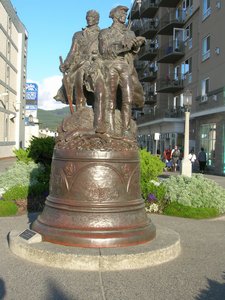5. Cities
Thursday Sept. 15, 2005. At suppertime I go back to Lewis and Clark and pick up Ari, and she and I go for supper downtown. (We get lost a little, or rather, get carried by traffic and slow reflexes across the river, and have to find our way back without being carried into Washington state.) The last time I had seen her, she was in high school, and here she is a sophomore in college, poised, intelligent and happy. (I can’t remember being poised, intelligent and happy at that age – or, for that matter, since.)
We eat at a nice Indian place she knows and we walk to Powells, for why would anyone visit Portland and not see Powell’s? But I have no real taste for book shopping. For the moment I have had enough of books, and besides, I have been up since 4:30 a.m. eastern time. I do find a Robert Crais I had been waiting for, but I am too tired to do the extensive browsing that once would have been a matter of course.
We have to cut the evening short, not only because it was three hours later for me than the clocks said, but because I am loathe to be driving after dark. Ever since a night a few years ago in Denver when I found myself road-blinded by some construction arc lights and couldn’t see the lanes of the road, I have had a healthy distrust of my ability to drive safely at night, especially in unfamiliar areas. So I get Ari back to the dorm and say goodnight, expecting to see her again the next day, after her classes were over.
Continue reading Oregon 2005 (3)

